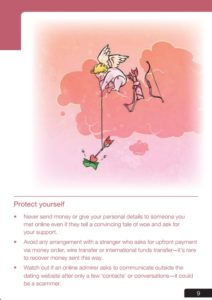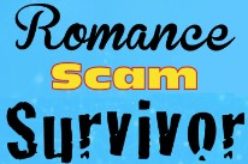The more contacts I have from people who have been scammed the more I see the different types of scams that are being carried out. The amount of ‘romance’ can vary. There are a number of types of activities that have building a relationship as a primary focus. You will find these listed on the governmental sites that talk about scams as Online Scams or Fraud, and this is a more generic description. Only when you read the detail does it make it clear this relates to what is commonly known as ‘romance’ or ‘dating’ scams.
In my blog I have focused on scams that use romance as the hook to then enable the scammer to exhort money. The contact mechanism is often dating sites, but can also be any membership site or social media such as Facebook or even communication mechanisms such as Skype or Viber. Whilst dating sites have the benefit (to the scammer) of legitimacy and expectation of making contact, because that is the purpose of the site, other mechanisms, like on Facebook, the scammer is putting out a ‘cold’ request for contact with no automatic expectation, except social convention and politeness perhaps, of a response. They must be successful though, because they keep doing it, and I know from victims who respond thinking “its just friendship, it can’t hurt”, that whatever lure they are using, it works.
Once contact is made, on the basis initially of friendship or common interest or even of charity and, in the case of romance scams quickly developing into love, information is gathered by the scammer. What they are looking for is what is your strongest motivation. Is it wanting a loving partner, is it the lure of money, or perhaps the need for financial security? This will be then combined with building an ongoing relationship, where the scammer takes the brain. Then the request for money can begin.

The reasons given by the scammer for needing money vary according to what they know about you, and the relationship that they have set up with you. It might be money for things that have gone wrong with their business dealings; to replace IT equipment that has been stolen or lost; to help with a family member in need or who is in hospital, or themselves in hospital after an accident (other members of their scamming team calling you as nurses or doctors demanding payment). They may also need help to travel – visa and tickets; accommodation costs. All of these will be accompanied by the relevant paperwork (forged) and with assurances that when they get to their rightful place (their home/your home) they will be able to access their plentiful funds and pay you back, with interest. In the context of a love relationship this seems a reasonable thing to do. When they realise there is no more of your money left, after you have given your life savings, mortgaged everything, taken as much credit as allowed, sold goods etc, they may stop their requests, or try yet more tactics such as threaten to make public revealing photos or videos so you come up with yet more money, somehow. Of course, when you are in the scam you are encouraged to think you will get that money back, and live happily ever after with your soul mate, but you most likely never will.
Another variation has the scammer receive a legacy/inheritance, or an unexpected find, or somehow have access to jewels or gold, which then requires many forms of customs duty or tax, insurance, packaging etc, again with relevant paperwork, and support from the scamming team acting as lawyers and customs agents, who also need payment. The goal is to get the goods/money back to you, and plays on your desire for easy money, combined with wanting to help a friend in difficulty. But its all a lie.
The 7:30 Report story I mentioned in my last blog shows someone who was tricked into money laundering activities with employment as the contact mechanism. She had made contact with what seemed to her to be a legitimate employer who then asked her to accept money into her bank account and pay the money to an overseas account. She assumed (initially) that this was a legitimate task of this new job. When a further request came, she realised all was not what it seemed. Versions of this include people being asked to take receipt of goods, eg, computers, and either sell them on eBay, forwarding the money gained, or, to forward the goods overseas. Be aware that this type of interaction is classed as money laundering and is illegal. People have been jailed for this type of activity in response to a scam.

Yet another form of romance scam involves travelling to meet the person of your dreams, and being asked to go via a third country to pick up documents/contracts required for their business. These documents turn out to be drugs, and when caught for carrying them, may result in time in jail in the worst of countries.
Any of these scams may also involve theft of personal and banking details, and may run in a series, ie one type of scam leads to another, to another, all focused on getting more of your money. Millions if not billions of dollars are lost to scams in Australia each year.
Secondary scams can include being approached by someone promising to find your scammer and get your money back. The fact that they have come to you via a form of social media is a sure indication that this is also a scam. Check legitimate websites and they will say they will never contact you that way.
There are many other types of scams that I have not covered here, but this covers those that have relationship as a primary element in the scam. And don’t forget the other hidden victim, the person who’s stolen photo you have fallen in love with.
Whichever the contact mechanism, or the type of scam, the impact on the relationship scam victim is loss of money, a feeling of being duped, a loss of trust in others and themselves, and little available recourse to get justice, let alone getting funds back. Reports should be made to ACORN and the local police, but responses from police may differ, ranging from support to victim blaming and discouragement of reporting (be insistent, and get copies and reference numbers. Though we want justice and our money back, unfortunately this is unlikely.
Other Resources:
- Little Black Book of Scams: a simple and useful description of differnt types of scams
- Scam Disruption Project: Warning signs of relationship scams
- ACORN: for reporting of scams, and descriptions of types of scams
- IDcare: National Identity support service for support with loss of IDs
- Stay Smart Online Alert Service: Sign up for newsletter on all sorts of scams


I was naive and accepted a friend request on Facebook.
In 2014/15 I was scammed out of my life savings, a good portion of my retirement and loans. Well in the 6 figures. Now my home is mortgaged.
I didn’t know what I hadn’t learned.
I had mo idea what evil lurked.
There was so much drama, professed gratitude for helping “him”,And of course promises of repayment. The scammers even created a very professional web page for a financial institution to show me he had funds to repay me.
My taxes were a night mare. There is nothing they will not do to deliberately con and steal with no regard to how the victims survive.
I was scammed for US$13,000 last summer in a very short period of time. I am not old, not lonely, and what’s more I wasn’t in love with the contact either. In that sense I am not “stereotypical” victim which media portraits.
Media portraits the victims as old, lonely and not tech savvy. Not true for my case and I guess therefore I was scammed.
I was naive for online dating for sure, it was my fist online dating experience, “he” was the first one contacted me. I had no idea how “normal people” would act on online dating therefore I could not distinguish scammers.
Contrary to what is portrait in media “he” was quite ‘aloof’. Didn’t bomber me with romantic words – otherwise I was put off at earlier stage.
I am genuinely sorry for those whose heart was robbed. My case it was only money, not small but I earn OK it’s not a crucial amount. Though some days I still think what I could have done with US$13,000 and do visits sites like this to tell-tale my experience for what, I guess looking for somewhere to vent the frustrations and looking for interactions with other victims on the same page, luckily my life didn’t get ruined.
I guess there are a lot of the victim stories that are similar to mine, contrarily to those drastic ones you read on media outlets. Then I guess many of the victims are just like me, who wasn’t old who was’t lonely either, but was just being naive for online dating and didn’t know what to expect.
“Different Types of Romance Scams”. I guess it is time to tell real stories that are not so drastic so that people, in hope, would stop thinking that only hopeless fools would fall for the scams.
Never in my life I would get scammed.
Yes, being naive to online dating is a key factor. It was my first time first contact as well. Thanks for your real story
Hi, thanks for your reply. Last sentence on my comment, I meant to write “Never in my life had I THOUGHT would get scammed”. – my typo